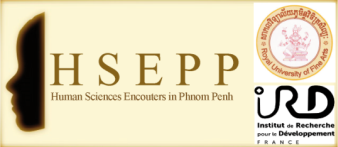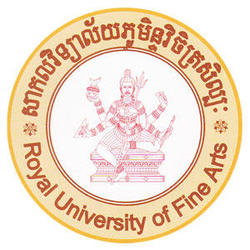Project initiators and partners
Initiators
UMI 233 trans VIH MI/INSERM U 1175
Université Royale des Beaux Arts Phnom Penh
Partners
http://sites.sas.upenn.edu/tlc/
logo tlcAgence Universitaire de la Francophonie - Bureau Asie Pacifique
HSEPP support the Manusastra Project
Newsletter, May-October 2013
May - October 2013 Digest
Dear HSEPP member,
The HSEPP team would like to apologize for such a long period of silence and the absence of monthly digest since April 2013. This was mainly due to a lack of available coordinating staff. Sapho Briand, who is normally in charge of coordinating the network, has been very busy with the development of the Manusastra project’s activities in the last six months, with the organization of its second Summer University, also called “Université des Moussons”, and the setting up of a new Master’s degree at the Royal University of Fine Arts, which will be launched in September 2014. For more information on the Manusastra project, please visit: https://sites.google.com/site/manusastraum/
Luckily, YOUK Sopheak, who recently graduated from the Royal University of Fine Arts, has agreed to join the HSEPP’s coordinating team from November 2013. HSEPP activities should therefore come back to a more frequent rate from November 2013 onwards. A warm welcome and thank you to YOUK Sopheak for its kind contribution!
Publications
Chams Clichés (3) – Mawlid Celebrations: Sweet Treats for the Dead & the Living by Emiko Stock
In some Cham villages in Cambodia, the air has seemed milder for several days with the sweet-scented promise of delicacies to come. A pleasant smell of frying escapes from homes between Udong and Battambang. It announces the post-harvest season, the time for a treat for the palates......
South East Asia Research, September 2013 issue (VOL 21, No 3)
A special issue of South East Asia Research, life after Collective Death in South East Asia
Guest Editors: Anne Yvonne Guillou and Silvia Vignato
Part 2 - Helping and being helped
http://www.ippublishing.com/sear.htm
http://www.ingentaconnect.com/content/ip/sear/2013/00000021/00000003;jsessionid=8kt3t428fe1s2.alice
Nos. 12-13, Cambodia Colonial Encounters, $32.00
The new publication of our double English/ French volume of Siksācakr, Journal of Cambodia Research focusing on Colonialism marks the 150thanniversary of the creation of the French Protectorate in Cambodia, which made the country a part of French Indochina. It also commemorates the 60th anniversary of the signature of the Geneva Accords, which sealed Cambodia’s independence.
Clichés Chams (2): The ‘’Ta Arabs’’ from India, by Emiko Stock
http://chamattic.wordpress.com/2013/09/21/cliches-chams-2-the-ta-arabs-from-india/#more-931
Interactions with a Violent Past, Reading Post-Conflict Landscapes in Cambodia, Laos, and Vietnam, By Vatthana Pholsena and Oliver Tappe
T he Second and Third Indochina Wars are the subject of important ongoing scholarship, but there has been little research on the lasting impact of wartime violence on local societies and populations, in Vietnam as well as in Laos and Cambodia. Today's Lao, Vietnamese and Cambodian landscapes bear the imprint of competing violent ideologies and their perilous material manifestations. From battlefields and massively bombed terrain to reeducation camps and resettled villages, the past lingers on in the physical environment.
http://www.nus.edu.sg/nuspress/subjects/history/978-9971-69-701-3.html
Decentralization and the promise of indigenous peoples' empowerment: the case of the World Bank in Cambodia, by Stefan Ehrentraut
This article analyzes the application of the World Bank's safeguards policy for indigenous peoples within the institution's support to decentralization reform in Cambodia. The analysis demonstrates that under certain circumstances, the policy not only fails to translate into effective protection but leads to outcomes diametrically opposed to its objectives. In its current design, Bank support to decentralization contributes to the marginalization of indigenous peoples in Cambodia and undermines the institutional, cultural and natural resources upon which their empowerment and participation depends. In environments in which full compliance might be unrealistic to accomplish by individual projects, safeguard obligations lead to a strategy on the part of Bank projects of avoiding geographical and policy areas that are likely to trigger the safeguards policy, in order to reduce projects’ vulnerability to non-compliance claims. The article discusses how more effective application of the safeguards policy might be achieved and how strategies for the empowerment of indigenous peoples can more effectively draw on decentralization frameworks.
http://www.tandfonline.com/doi/abs/10.1080/09512748.2010.546872
Perpetually temporary: citizenship and ethnic Vietnamese in Cambodia
There is a clear trend in Western democratic countries towards regularizing the status of long-term ethnic minority residents through the conferral of full and equal citizenship rights. Ethnic minorities who arrived as irregular or temporary migrants in the West are increasingly allowed to follow the immigrant path towards integration into the broader citizenry. This is largely due to recognition that the price of exclusion is not only unjust, but it increases the risk of racial tensions, criminality, and social violence. Investigating the relevance of these Western developments to Cambodia, this article focuses on Cambodia’s ethnic Vietnamese minority. Despite residing in Cambodia for generations, ethnic Vietnamese have traditionally been regarded as ‘foreign residents’ and denied citizenship. Based on extensive field research, this article considers the history and reality of Cambodia’s ethnic Vietnamese minority as well as the ethnically-exclusionary policies and practices of the state and Khmer majority towards them.
http://www.tandfonline.com/doi/abs/10.1080/01419870.2010.537359
Hill, H. and J. Menon (2013). "Cambodia: Rapid Growth with Weak Institutions." Asian Economic Policy Review 8(1): 46-65.
This paper examines Cambodia's socioeconomic development since the early 1990s peace settlement. The country's economic growth has arguably been the fastest among post-conflict societies, driven by the credible restoration of peace and security, large public and private capital inflows, economic openness, reasonably prudent macroeconomic management, and a dynamic, integrating neighborhood. A legacy of history and small size is that the government has limited policy space, although this has not necessarily retarded economic development. We also highlight some key challenges, including rising inequality, uneven spatial development, weak institutions, and high levels of corruption. Looking forward, we highlight the importance of strengthening supply side capabilities, broadening the benefits of growth, and developing stronger institutions and property rights.
http://onlinelibrary.wiley.com/doi/10.1111/aepr.12003/abstract
Reimer, J. K. and P. Walter (2013). "How do you know it when you see it? Community-based ecotourism in the Cardamom Mountains of southwestern Cambodia." Tourism Management 34(0): 122-132.
In this case study of a community-based ecotourism project in the rainforest of southwestern Cambodia, Honey’s (2008) analytical framework for “authentic” ecotourism is applied to examine the social dimensions of sustainable ecotourism. Following a discussion of the meaning of ecotourism in the literature and an overview of ecotourism in Cambodia, the study site, research methodology and findings are presented. In this exploratory case study, qualitative research methods included participant observation, interviews, focus groups and analysis of project documents. Findings for each of Honey’s seven analytical categories showed the complexity of community-based ecotourism in addressing often contradictory concerns of environmental conservation, local livelihood, and cultural preservation, and the importance of local context to management of ecotourism. The social dimension of gender, while not explicit in Honey’s framework, was also seen to be a key analytical category for community-based ecotourism and sustainable development.
http://www.sciencedirect.com/science/article/pii/S0261517712000659
Singh, P. N., S. Khieng, et al. (2013). "Validity and Reliability of Survey Items and Pictograms for Use in a National Household Survey of Tobacco Use in Cambodia." Asia-Pacific Journal of Public Health.
The validity of survey measures of smoked and smokeless tobacco use in the Western Pacific Region is often unknown. We conducted a validation study (n = 201) in a random sample of rural adults in Cambodia. A comparison with salivary cotinine indicated (1) that survey items and pictograms of current tobacco use had an 87% (95% confidence interval [CI] = 78%-93%) sensitivity, 94% specificity (95% CI = 87%-98%), and 93% (95% CI = 85%-97%) positive predictive value in detecting cotinine levels >10 ng/mL; (2) a positive correlation with number of cigarettes smoked (R = 0.34; P = .01); and (3) a positive correlation with the amount of tobacco chewed (R = 0.44; P = .02). The validity of the index for the amount of smokeless tobacco used was enhanced by adding to the index the data from pictograms that were utilized to help participants estimate the amount of loose tobacco used per session. These tobacco items and pictograms were found to have excellent reliability (κ = 0.80-1) over 2 to 3 weeks. Interviewer-administered survey items and pictograms can provide an accurate, quantitative measure of smoked and smokeless tobacco use in rural Cambodia.
http://aph.sagepub.com/content/early/2013/05/16/1010539513486920.abstract
Call for papers / conferences
Call for paper: The 40th annual meeting of the French Colonial Historical Society.
June 25th – 28th 2014, Siem Reap, Cambodia.
Deadline: October 15th 2013
Send to: siemreapfchs2014@gmail.com
Languages: English and French
http://www.frenchcolonial.org/index.php/locationsprograms/upcoming-meeting/call-for-papers
Events:
Eurasiane upcoming international events
http://www.eurasiane.eu/?page=coming-soon
Sexual Violence Research Initiative
Bangkok, Thailand: 14-17 October 2013
http://www.svri.org/forum2013/
Fourth Asia Pacific Conference on Public Health
Nha Trang, Vietnam: 21-22 October 2013
http://www.wfpha.org/event-detail/events/57.html
Third Annual Conference on Language, Literature, and Linguistics
Bangkok, Thailand: 9 -10 June 2014
http://www.l3-conference.org/index.html
Next CKS presentation: Sakarai Bani: The reconciliation of Localization and Ta’rick, by William B. Noseworthy, CKS Senior Research Fellow
Date : 25/10/2013
Time
: 6 - 7.30 pm
Venue
: CKS Phnom Penh
234 Street 450
Tuol Tumpung II, Chamkamorn,
Phnom Penh
Please Confirm attendance
by 24/10/2013
Email
:
puthea_sim@khmerstudies.org
or call
023 991 937
Job Opportunity
Community organizer and social researcher: 2 Consultancies open with E&D
Enfants&Developpement is looking for 2 consultants to support its Sexual and Reproductive Health Project in Kompong Speu.
Deadline: Consultancies open till fulfilled - implementation schedule flexible
http://enfantsetdeveloppement.org/offres.php?p=emp
News
Trans Asia Photography Review: Important articles’ Translation and Dissemination Opportunity!
Do you know of an important article about photography, written in Chinese, Bengali, Khmer or another Asian language, that deserves to reach a larger international audience? The spring 2014 issue of the TAP Review will feature translations of such articles – about photography from Asia - into English. It is an opportunity for historically important writings to become more widely read.
Please send us your suggestions of articles that you think should be translated; we have a small budget for translation.
At this time I would also like to introduce Shastri Akella, who will be the new Managing Editor of the TAP Review. You can reach both of us at
editor@tapreview.org
.








